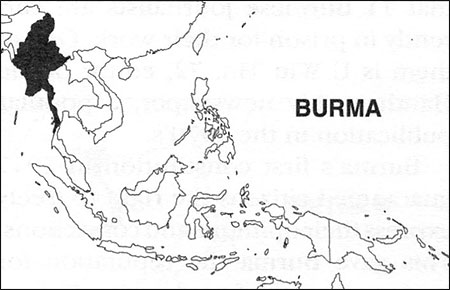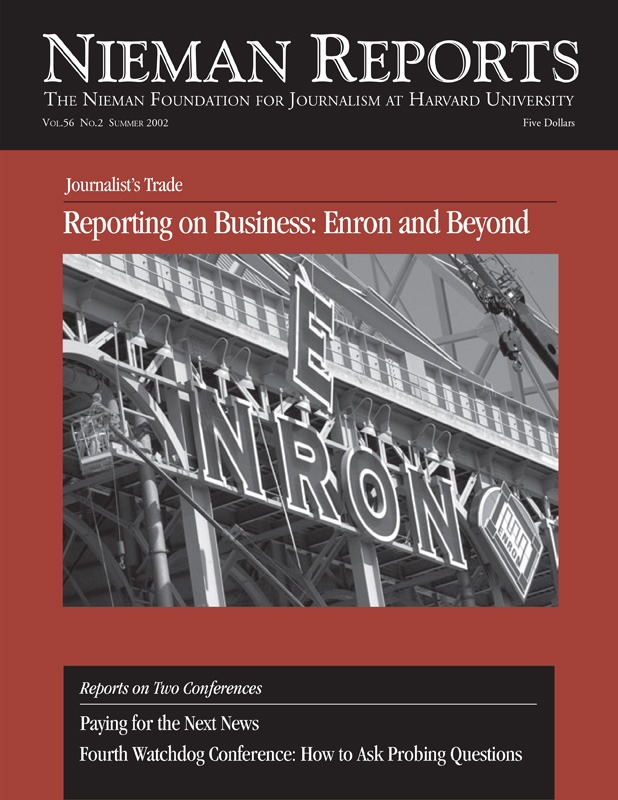
RELATED ARTICLE
"Introduction"
- Melissa Ludtke, EditorMuch of Southeast Asia is experiencing a greater degree of democracy and openness than in the past. Yet in Burma the opposite is true. This country, still ruled by generals, remains one of the region’s most restrictive and repressive countries, and the effect of this repression is felt by journalists. In 1998, the New York-based Committee to Protect Journalists (CPJ) described Burma and Indonesia as the region’s two foremost enemies of the press. Yet, since the fall of Suharto in that same year, Indonesia’s mass media have blossomed, leaving Burma with the dubious distinction of being the region’s number one adversary of the press.
While journalism in Burma is in a deep coma, it is not dead. But there are many topics considered off-limits by Burmese media, which primarily serve as the government’s voice. Among the taboo topics are storms and fires, plane crashes and student brawls in teashops, regional turmoil and the trials of South Korean dictators, and the activities of the opposition party. The government’s press scrutiny board will not allow the media to publish news that could in any way reflect badly on the regime. Thus, even storms and fires—which cause large numbers of deaths due often to inferior construction or slow response—are ignored, lest they lead to criticism.
Recently, a massive fire broke out in Yenanchaung, central Burma, causing numerous deaths and the destruction of hundreds of homes. Nevertheless, the State Peace and Development Council in the military government failed to inform the public. Government mouthpieces such as The New Light of Myanmar and The Mirror shied away from reporting this news because of the unfavorable light their coverage could cast on the regime. And local journals did not dare mention the alleged coup attempt by former dictator General Ne Win’s family members. Ne Win and his daughter Sandar Win are now under house arrest, and many army officials have been implicated in the alleged coup attempt.
Thus, news-starved Burmese tune in to shortwave radio stations such as the BBC, VOA or the Washington-based Radio Free Asia (RFA) for alternative news. These radio stations have gained popularity because the government’s news dispatches are no longer reliable for the general public. And journalists are wary of government intrusion, too. Rangoon-based correspondents working for wire services are wary of contacting outsiders since they know their phones are being tapped. Recently, a journalist who was covering the surprising arrest of Ne Win’s family members shared with me that he “was really worried after I wrote the story [of the arrest]. I was waiting for visitors.” By visitors, he meant intelligence officers. He was fortunate: No visitor arrived.
Similarly, weekly journals published by local journalists “understood” that they should not run the story about the attempted coup since they are also under the watchful eye of Burma’s “media police,” the Press Scrutiny Board (PSB). Like their counterparts in Cambodia and Thailand, countries where hired hit men often silence critical voices with grenades or bullets, reporters in Burma must have great courage to adhere to the principles of journalism.
Though Burmese journalists don’t necessarily confront such murderous threats, publishing critical pieces without PSB approval can earn writers lengthy prison sentences. It is estimated that 11 Burmese journalists are currently in prison for their work. One of them is U Win Tin, 72, editor of the Hanthawaddy newspaper, a popular publication in the 1970’s.
Burma’s first constitution in 1947 guaranteed citizens the right to freely express their opinions and convictions. This gave Burma the reputation for having one of the freest presses in Asia. But following the military coup in 1962, press freedom vanished in Burma and Burmese journalists came under increased scrutiny. Many were thrown into prison. Newspapers were nationalized and foreign news agencies were told to pack their bags. This marked the beginning of the information dark ages in what is known as the Golden Land.
A new constitution in 1974 also granted freedom of expression. Under Ne Win’s 26-year socialist dictatorship, however, all forms of public expression were subjected to the PSB to ensure that these “freedoms” would be expressed only “within the accepted limits of the ‘Burmese Way to Socialism.’” With advances in information technology, the generals are now also frightened by the possibilities of electronic communication and the Internet, even though penetration by these technologies is quite small. There are some 4,000 e-mail users in Burma, which has a population of about 50 million. The military junta recently announced that it will issue 10,000 new e-mail accounts. But they also restrict access to 800 Internet Web sites in addition to 50 Web sites on the local Intranet. All incoming and outgoing e-mail messages are monitored by authorities.
Despite these barriers, the Myanmar Times and Business Review, edited by Australian Ross Dunkley, was launched in Rangoon in 2000.This new publication professes to be Burma’s first truly independent newspaper. Most observers consider this claim specious since the publisher is known to have close ties to the junta’s dreaded Military Intelligence Services (MIS). In fact, the launch of the newspaper was the brainchild of high-ranking military intelligence officials desperate to whitewash Burma’s pariah status.
What this newspaper represents is the latest attempt in a public relations campaign aimed at giving Burma’s notoriously xenophobic regime a more “foreigner-friendly” image. With its foreign editor, attractive layout, and polished English, the Myanmar Times is a symbol for the international community to show that Burma is a “normal” country fit for foreign investment. The paper enjoys special privileges local journalists do not. For instance, the arrest of Ne Win’s family was covered in Myanmar Times. Reporting of that event, however, did not venture beyond the official government version.
This “VIP newspaper” has also been allowed to publish some sensitive news, such as the secret talks between the State Peace and Development Council and opposition party led by Aung San Suu Kyi and visits of the U.N. special envoy and human rights investigator. But only the positive side of the story is allowed to be published; news critical of the government is still censored.
Like most issues in Burma, the growing HIV/AIDS crisis has been highly politicized. The state-run press typically responds to criticism of the junta’s handling of the crisis by denying that it even exists, an approach similar to that of the Burmese government, which is also in denial of the country’s AIDS situation. Health experts warn that Burma is facing an AIDS time bomb, but there is insufficient information available to confirm this prediction. Burma’s health ministry puts the number of HIV positive people at only 40,000, but in December 2001 the AIDS epidemic update of the Joint United Nations Program on HIV/AIDS estimated that more than half a million people in Burma are HIV-positive, potentially leading to a full-blown AIDS epidemic.
Though more HIV/AIDS information and educational materials are gradually becoming available and stories are now being published in the state-run press, Burma’s health workers say such an effort is outdated and insufficient to tackle the problem. They also point out that heavily censoring AIDS news and failing to utilize the mass media as a weapon to fight against the disease will result in many more people becoming infected with HIV.
The Myanmar Times has taken a different approach: It does not avoid coverage of the known facts but focuses its reporting on “positive” stories, such as the charitable work of junta-connected businessmen. The paper has also begun to publish a Burmese-language version, designed to convince a domestic audience that things are not really as bad as they seem. But Burmese readers familiar with the English-language version have already dismissed the Myanmar Times as slick propaganda.
Today, public access to information in Burma is nearly nonexistent. The regime does not release economic figures or defense budgets, and consequently the Burmese people have little idea of the nature of the government that has ruled the country for decades. This is particularly disheartening given the good reputation Burma had in its past for support of press freedom.
The public dissemination of information through mass publications became a fact of life during the early years of British colonial rule in Lower Burma. Maulmain Chronicle, an English-language weekly, became Burma’s first newspaper in 1838. King Mindon, who continued to rule in Upper Burma despite the colonial presence, was impressed with the newspapers that reached him from lower Burma and India. The King even invited some newspaper editors to speak with him about his desire to publish a newspaper. In March 1875, Yadanabon-Nay-Pyi-Daw, or the Mandalay Gazette newspaper, was published.
King Mindon also introduced a new press law, which consisted of 17 articles. In part, his law read: “If I do wrong, write about me. If the queens do wrong, write about them. If my sons and my daughters do wrong, write about them. If the judges and mayors do wrong, write about them. No one shall take action against the journals for writing the truth. They shall go in and out of the palace freely.”
According to veteran journalist and Burma-watcher Bertil Lintner, “This act must be one of Southeast Asia’s first indigenous press-freedom laws, and it was hardly a coincidence that it happened in Burma, a country that has always had a high literacy rate and where education has been a source of national pride since pre-colonial days.”
Because its chief editor quit, Yadanabon-Nay-Pyi-Daw did not last long before the British invaded Upper Burma in 1885. But what if Yadanabon-Nay-Pyi-Daw had still been informing the public and could have told them about British troops coming into Burma? Even a few days before the invasion, people in Mandalay had little idea of what was going to happen to their country. It was not until the British gunboats finally arrived at Gawwain jetty that rumors became reality and Burma was colonized for several decades. If Yadanabon-Nay-Pyi-Daw had still been publishing, history could be different.
In the 21st century, information and education are the engines that empower individuals and countries. But inside Burma, as in the time of the British invasion in 1885, Burmese people are still being kept in the dark.
Aung Zaw is editor of Irrawaddy Magazine, a magazine on Burmese and Southeast Asian affairs.



